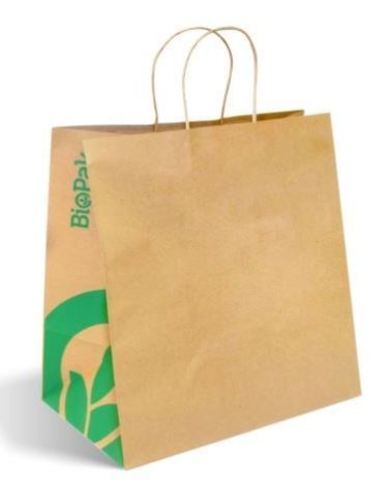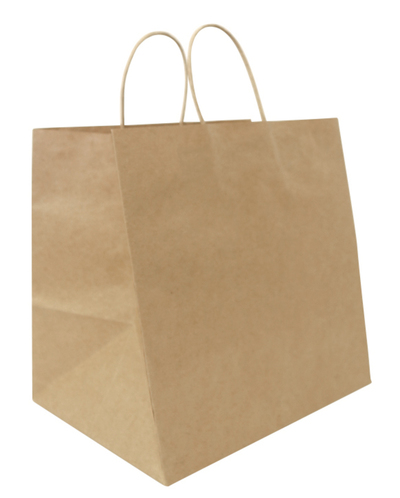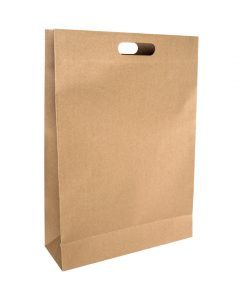Are paper bags better for the environment?
This is not a straightforward question, and there are environmental pros and cons to the manufacture and use of brown paper bags over plastic bags.
The key to understanding the comparative environmental impacts means looking at every stage of the life cycle of each type of bag and considering the following:
- How much energy is used to make paper bags?
- How many times can bags be reused?
- How quickly do bags decompose?
Energy in production
Studies conducted in 2011 highlight the fact that even though paper bags are made from trees, which are, in theory, a renewable resource, it takes significantly more energy to create pulp and manufacture a paper bag than it does to make a single-use plastic bag from oil. It found the biggest environmental impacts of all types of shopping bags came during the production process, not in their use or how they're disposed of.
Reusability
 The report says that paper bags use four times more energy and greenhouse gas emissions to produce than plastic bags. It also says that to make paper bags, forests need to be cut down and the manufacturing process produces a higher concentration of toxic chemicals than in the making of single-use plastic bags.
The report says that paper bags use four times more energy and greenhouse gas emissions to produce than plastic bags. It also says that to make paper bags, forests need to be cut down and the manufacturing process produces a higher concentration of toxic chemicals than in the making of single-use plastic bags.
The study also concluded that you would have to reuse a paper bag at least three times before its environmental impact equalled that of a high-density polyethylene plastic bag used only once. So, when plastic bags were used over and over, they looked many times better than paper bags.
When it comes to reuse, the practical consideration is whether paper bags will last long enough to survive at least three trips to the supermarket, being more likely to split or tear than plastic bags, especially if they get wet. The 2011 study said it was unlikely paper bags can be regularly reused three times due to these durability issues.
Decomposition of bags
Paper bags do degrade more easily in the right conditions than plastic bags. Plastic bags can take between 400 and 1,000 years to decompose and are creating dreadful waste issues. They end up in the oceans, and are a threat to wildlife, which can mistake them for food.
Bag choice is still not cut and dried
 But as we said, this is not a straightforward, cut and dried issue. And, to make matters more complicated, the claims around paper bag production and reuse we have discussed are from studies made at least a decade ago that assume that paper bags are all made from virgin materials.
But as we said, this is not a straightforward, cut and dried issue. And, to make matters more complicated, the claims around paper bag production and reuse we have discussed are from studies made at least a decade ago that assume that paper bags are all made from virgin materials.
What we can be sure of though, is that it is crucial that people think about how they are using bags, whatever they’re made of, and then use them more than once.
In favour of paper bags
Paper bags can be made using recycled materials. In fact, most brown paper bags on the market are a mixture of both raw and recycled materials, not just pure virgin wood, and they are not bleached. So, because fewer trees are chopped down, less energy is used and not as much waste is created in their manufacture. According to a University of Southern Indiana paper, each tonne of recycled paper can save 17 trees, 380 gallons of oil, three cubic yards of landfill space, 4,000 kilowatts of energy and 7,000 gallons of water. This represents a 64 per cent saving on energy; a 58 per cent saving on water and 60 pounds less of air pollution.
Despite trees being cut down to make paper bags, forests are renewable resources and, if managed responsibly are also sustainable. When new trees are planted, carbon footprints are offset.
Recycling and composting
The fact that paper bags are recyclable helps lessen their impact. Paper bags are made from organic materials which decompose more quickly than plastic. In compost piles, paper bags will degrade in about 16 weeks and when they do break down, they don't leak any toxic chemicals back into our air, soil or waterways.
Using bags over again
 The 2006 study said a paper bag needs to be reused at least three times to be as environmental equal of a single-use plastic bag. Since those earlier studies, packaging manufacturing and waste management processes and technologies have evolved and improved. It is now much easier to buy paper bags in a variety of thicknesses and designs. We sell paper bags that may be stronger than you may imagine, including paper bags with excellent wet-strength properties that they keep their strength even in the rain. Paper bags can also be re-used at home in a number of ways, not just for shopping.
The 2006 study said a paper bag needs to be reused at least three times to be as environmental equal of a single-use plastic bag. Since those earlier studies, packaging manufacturing and waste management processes and technologies have evolved and improved. It is now much easier to buy paper bags in a variety of thicknesses and designs. We sell paper bags that may be stronger than you may imagine, including paper bags with excellent wet-strength properties that they keep their strength even in the rain. Paper bags can also be re-used at home in a number of ways, not just for shopping.
Paper bags or plastic?
Because paper bags have an environmental cost upfront, and plastic bags create greater negative effects after being used, it is hard to know which type of bag is truly the most sustainable. In every study and for every type of bag, it was clear that reusing the bag as many times as you can reduces its impact on the environment.
Overall, making the effort to reuse any bag that comes into your possession, and disposing of the bag responsibly, is key.
Whether you're out shopping and trying to choose between paper and plastic or you're a business trying to decide whether to invest in paper bags or plastic carriers, education is the key to making a more informed decision.
An environmental choice
In my opinion, because they are made from a combination of recycled and raw materials which reduces their greenhouse gas emissions and because they decompose in a natural way and because they're more widely recycled than plastics, paper bags are a good environmental choice.
So, if you, like me, would prefer to go the way of the paper bag, check out our ever-expanding range in our shop. All our brown paper bags and paper bags with handles are reliably strong, dependably durable, chemical-free, made from a combination of recycled and virgin materials sourced from sustainable sites, and they are fully compostable.
Check out our product lines or talk to us about how we can help you choose the paper bags to suit your business. Call 0508 467 462 or you can email us at any time.
By using paper bags, you can make a small difference to the environment and get to feel good for being part of something big: a movement by environmentally conscious organisations who want to do better for the world we live in.
Posted: Friday 28 May 2021


